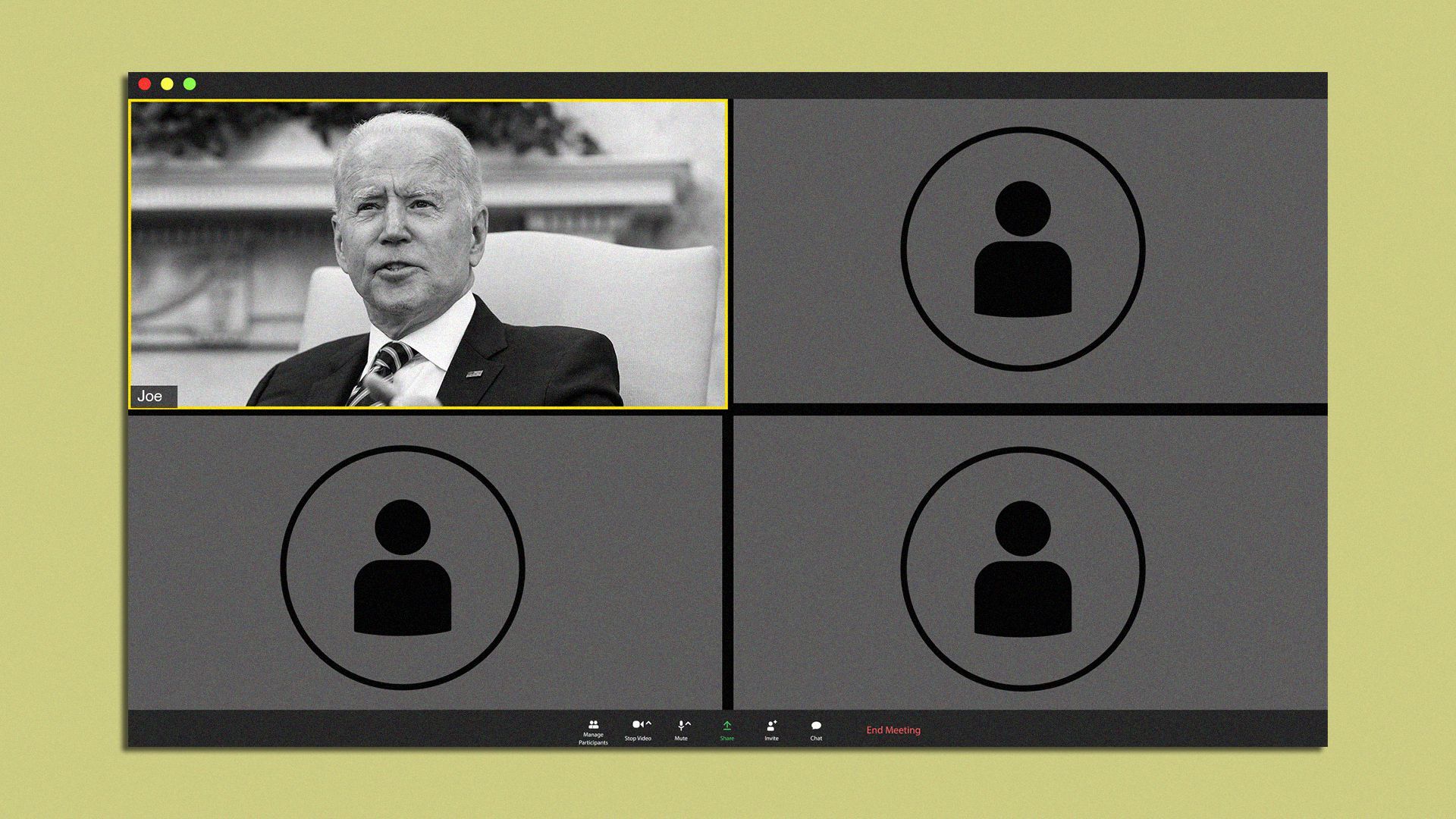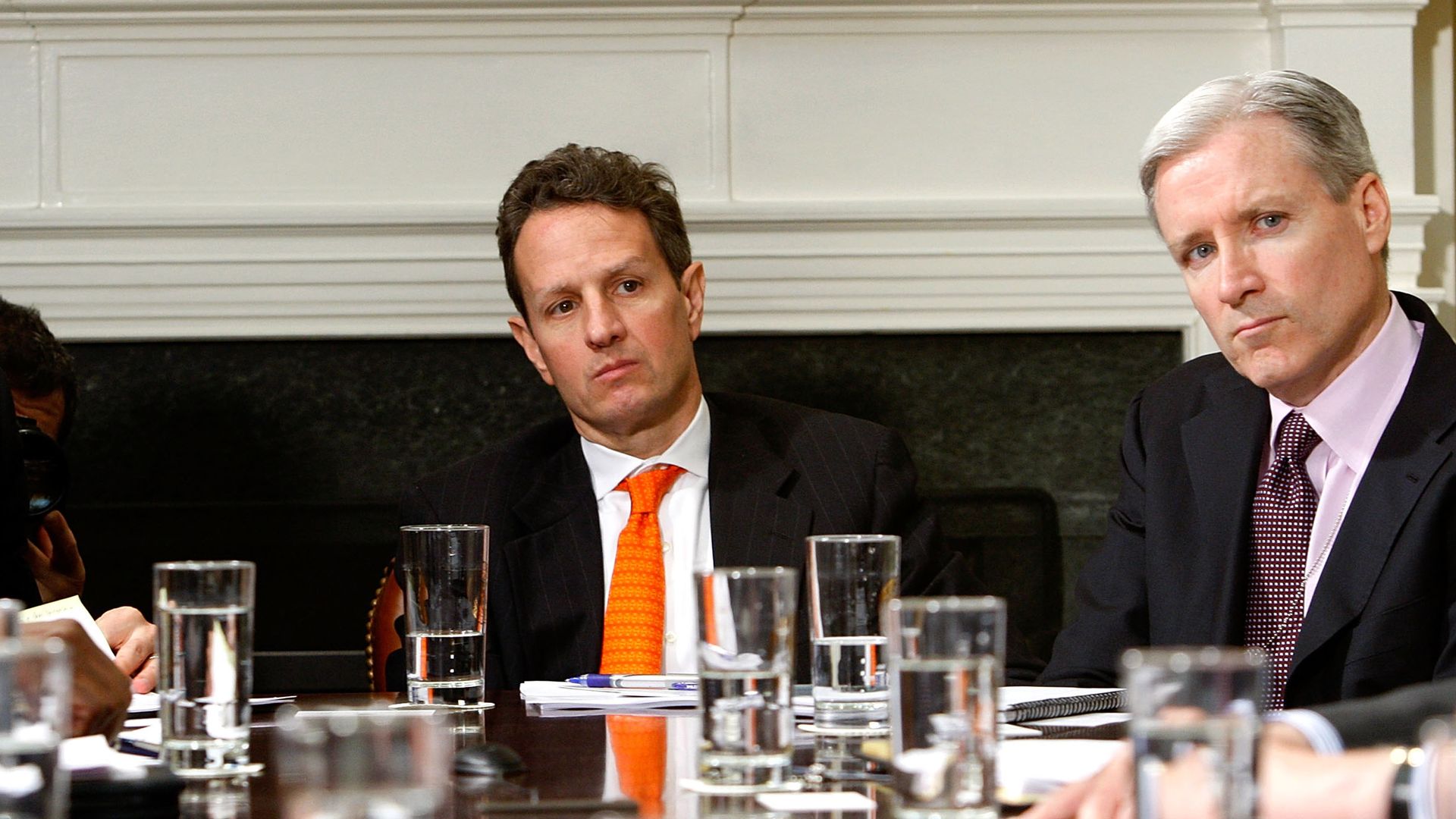| | | | | | | Presented By UnitedHealth Group | | | | Axios Sneak Peek | | By Alayna Treene and Hans Nichols ·Jun 30, 2021 | | Welcome back to Sneak. ⚡ Situational awareness: House Minority Leader Kevin McCarthy (R-Calif.) will meet tomorrow with the Problems Solvers Caucus, Axios' Sarah Mucha reports. - Al Eisele, longtime editor of The Hill and former press secretary to Vice President Walter Mondale, died Tuesday, his daughter announced on Facebook.
Smart Brevity™ count: 1,295 words ... 5 minutes. Edited by Glen Johnson. | | | | | | 1 big thing: GOP tax attack |  | | | Illustration: Sarah Grillo/Axios | | | | Republican senators are rallying against one of the main ways President Biden wants to pay for his infrastructure deal — a $40 billion infusion to help the IRS collect $100 billion more in taxes, Axios' Jonathan Swan and Alayna Treene report. Why it matters: If this partisan sentiment is as widespread as several Axios interviews suggest, it raises doubts about whether the Internal Revenue Service funding proposal can make it into law. That makes the math even fuzzier for how to pay for the $1.2 trillion deal. What they're saying: Sen. John Barrasso (R-Wyo.), chair of the Senate Republican Conference, told Axios that "spending $40 billion to super-size the IRS is very concerning," and "law-abiding Americans deserve better from their government than an army of bureaucrats snooping through their bank statements." - Sen. Ted Cruz (R-Texas): "Throwing billions more taxpayer dollars at the IRS will only hurt Americans struggling to recover after waves of devastating lockdowns. ... Instead of increasing funding for the IRS, we should abolish the damn place."
- Sen. Marsha Blackburn (R-Tenn.): "A $40-billion increase in funding for the IRS will lead to a huge potential for abuse. Bigger government results in more waste, fraud and abuse."
- Sen. Lindsey Graham (R-S.C.): "A lot of this can be pie in the sky. ... There's some people on our side who don't like empowering the IRS; I don't mind empowering the IRS if it's a reasonable thing to do. But I mean, how much uncollected taxes can you gather with $40 billion?"
Graham's comments are noteworthy given he has announced his backing for the deal. Flashback: Congressional Republicans have worked to starve the IRS by shrinking its budget by roughly 20% from 2010 to 2018. - Smaller IRS budgets mean fewer audits — and more room for tax evasion.
- According to the Washington Post, those cuts led to 30% declines in the number of employees in the IRS enforcement division, "with even steeper drops among the highly specialized workers who handle the most complex cases."
- The bipartisan infrastructure deal would inject the agency with a substantial boost in funding — increasing its annual budget by more than a third over 10 years.
Keep reading. |     | | | | | | 2. House targets secret White House visitors |  | | | Photo illustration: Shoshana Gordon/Axios. Photo: Doug Mills/New York Times/Pool/Getty Images | | | | A House committee is trying to force the White House to disclose its virtual visitors, using the power of the purse to push the West Wing to retroactively reveal who's been Zooming-in since January, Axios' Lachlan Markay reports. Why it matters: The president's team has begun disclosing in-person visitors, resuming a practice abandoned by Donald Trump. But the pandemic has forced huge segments of its work into cyberspace, and transparency advocates say the continued refusal to disclose virtual visitors is keeping the public in the dark. What's new: Language approved yesterday by the Democrat-led House Appropriations Committee seeks to compel the White House to produce virtual visitor logs, as well. - A committee report accompanying a general government appropriations bill directs the White House to retroactively reveal all virtual visitors going back to Inauguration Day.
- "(T)he Committee is concerned that social-distancing procedures and the resulting increase in virtual meetings will limit the amount of relevant disclosures and harm the public interest," it wrote.
- The report directs the president's staff to brief the committee on its efforts to disclose that information by the fall.
What they're saying: Rep. Mike Quigley (D-Ill.), who chairs the Appropriations panel on financial services and general government, added the language to the committee report. - In a statement emailed to Axios, Quigley called the lack of virtual visitor logs "a loophole" in the White House's transparency efforts.
- "While I am very encouraged that the Biden Administration reinstated the policy of publicly disclosing their White House visitor logs in May, I look forward to working with them to establish virtual visitor logs to ensure and expand accountability in the executive branch," Quigley wrote.
- The White House did not respond to inquiries about the language. Press secretary Jen Psaki previously said the administration had no plans to disclose virtual visitors.
Be smart: Quigley's language is not legally binding, since it's contained in a committee report rather than the appropriations bill itself. But his office expects the White House will play ball. - "Report language does not have statutory force, (so) departments and agencies are not legally bound by their declarations," according to the Congressional Research Service.
- "These documents do, however, explain congressional intent, and executive branch agencies take them seriously because they must justify their budget requests annually to the Appropriations committees."
|     | | | | | | 3. By the numbers: Proxy voting in House |  Data: Brookings Institution/Clerk of the House of Representatives; Chart: Will Chase/Axios House Majority Leader Steny Hoyer (D-Md.) recently worked from home and voted by proxy after having knee replacement surgery, and House Speaker Nancy Pelosi (D-Calif.) says she will extend the practice for all members into August. Why it matters: Congress instituted the system — allowing members to assign someone else to vote for them — as a precaution against spreading the coronavirus. Since then, its use in the House has vacillated, according to data from the House Clerk collected by the Brookings Institution and reviewed by Axios' Stef Kight. - Proxy voting has let members vote if they couldn't or chose not to show up in person because of COVID-19 or didn't want to return to the Capitol after the Jan. 6 attack, as Brookings researchers note.
- It's also allowed people to cast a vote while dealing with long- and short-term health issues or while on family leave.
By the numbers: As of June 23, 43 members had active vote-by-proxy letters. - At the peak, 138 members had active letters.
|     | | | | | | A message from UnitedHealth Group | | UnitedHealth Group's commitment to sustainability | | |  | | | At UnitedHealth Group, sustainability is an extension of our business strategy, culture and mission to: - Help create a modern, high-performing health system.
- Foster an inclusive and diverse culture.
- Maintain strong corporate governance.
- Minimize our environmental impact.
Learn more. | | | | | | 4. Scoop: Wall Street vet leaving Kerry's climate team |  | | | Mark Gallogly (right) sits with former Treasury Secretary Timothy Geithner at the White House in November 2009. Photo: Alex Wong/Getty Images | | | | Mark Gallogly, a private-equity titan who's been working for John Kerry to line up private-sector financing to combat climate change and serve as a liaison to the business community, is leaving the administration, Axios' Hans Nichols has learned. The big picture: Gallogly is departing almost as quietly as he joined, with one difference: Kerry, Biden's special envoy for climate, is publicly acknowledging his role — and his contributions. - "When I was appointed to this role, Mark was among the first people I called on to join the effort," Kerry said in a statement to Axios.
- "In recent months, he's brought his considerable private-sector experience, financial acumen and climate activism to bear in facilitating productive conversations with the financial institutions and companies that will be key to implementing the ambitious climate solutions we need."
- Gallogly retired in 2020 from Centerbridge Partners, a private equity firm he co-founded after 16 years at Blackstone. He never was expected to stay at the State Department long term. His last day was today.
Why it matters: Gallogly's departure is a sign Kerry's international climate office is past its start-up phase and has established crucial inroads with Wall Street, ahead of the United Nations Climate Change Conference in Glasgow in November. - Gallogly's arrival at State, first reported by Axios in March, caused consternation among progressives, who questioned why Kerry — a former secretary of State and senator — was working with someone with a background in private equity.
- But Kerry has made it clear he thinks private-sector financing is vital to reducing carbon emissions by funding clean technologies.
- In April, the White House touted pledges from JPMorgan Chase and Citigroup to steer trillions of dollars into sustainability efforts.
Go deeper: As the White House works to get its infrastructure proposals through Congress, it's highlighting the green-energy provisions in the $579 billion bipartisan deal. - It's also telegraphing that the president has much more planned for climate.
- The White House plans to use the filibuster-proof budget reconciliation process to mandate that power companies adopt a "clean-energy standard," Axios reported Tuesday.
|     | | | | | | 5. Pic du jour |  | | | Photo: Brandon Bell/Getty Images | | | | Texas Gov. Greg Abbott, a Republican, greets former President Donald Trump during a border security briefing in Weslaco, Texas. |     | | | | | | A message from UnitedHealth Group | | Helping to create a modern, high-performing health system | | |  | | | | UnitedHealth Group is committed to expanding access to high-quality, affordable care that achieves better outcomes and enhances the health care experience. We are partnering to advance health equity and support the communities where we work and live. Learn more in our Sustainability Report. | | | | 📬 Thanks for reading. A reminder your family, friends and colleagues can subscribe to this or any of Axios' other free newsletters by clicking here. |  | | It'll help you deliver employee communications more effectively. | | | | | | Axios thanks our partners for supporting our newsletters. If you're interested in advertising, learn more here.
Sponsorship has no influence on editorial content. Axios, 3100 Clarendon Blvd, Suite 1300, Arlington VA 22201 | | | You received this email because you signed up for newsletters from Axios.
Change your preferences or unsubscribe here. | | | Was this email forwarded to you?
Sign up now to get Axios in your inbox. | | | | Follow Axios on social media:    | | | | | |
Post a Comment
0Comments